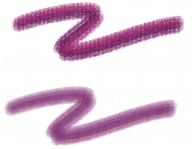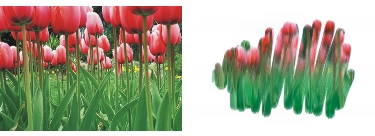
Quick links to procedures on this page:
• |
The brush method defines the most basic level of brush behavior and is the foundation on which all other brush variables are built. The method and method subcategory represent attributes of the stroke’s appearance.
Because the method sets a brush variant’s most basic behavior, you can alter a variant’s behavior by changing its method. For example, suppose you want a stroke that looks like charcoal, but instead of hiding underlying strokes, you want the brushstrokes to build to black. You can get this effect by changing the method to Buildup. Perhaps you want a variant of the Pens brush category to smear underlying colors. You can change its method from Cover to Drip. Some brush effects are less easily affected by other methods, and results may differ.
Each method can have several variations, called method subcategories. These subcategories further refine the brush behavior. The following terms are used in describing most method subcategories:
• |
Soft methods produce strokes with feathered edges.
|
• |
Flat methods produce hard, aliased strokes with pixelated edges.
|
• |
Hard methods produce smooth strokes.
|
• |
Grainy methods produce brushstrokes that react to paper texture.
|
• |
The words “edge” and “variable” are sometimes used to describe a method
subcategory. Edge strokes are thick and sticky-looking. Variable strokes are affected
by tilt and direction.
|
Combining a method with a method subcategory results in a specific brush style that you can assign to a given brush. For example, Grainy Hard Cover brushstrokes interact with paper grain and are semi anti-aliased so that they hide underlying pixels. Grainy Hard Cover is the default method for Chalk and Charcoal.

Grainy Hard Buildup was used to create the brushstroke on top. Soft Variable Buildup was used to create the stroke on the bottom.
Corel Painter supplies the following methods:
• |
Buildup
|
• |
Cover
|
• |
Eraser
|
• |
Drip
|
• |
Mask (Cover)
|
• |
Cloning
|
• |
Wet
|
• |
Digital Wet
|
• |
Marker
|
• |
Plug-in
|
The Buildup methods allow you to produce brushstrokes that build towards black as they are overlaid. A real-world example of buildup is the felt pen: scribble on the page with blue, then scribble on top of that with green, and then red. The scribbled area keeps getting darker, approaching black. Even if you were to apply a bright color like yellow, you couldn’t lighten the scribble — it would stay dark. Crayons and Felt Pens are buildup brushes.

An example of the Buildup method.
The Cover methods produce brushstrokes that cover underlying strokes, as oil paint does in traditional painting. No matter what colors you use, you can always apply a layer of paint that completely hides what’s underneath. Even with a black background, a thick layer of yellow remains pure yellow. Some Chalk and Pen variants are examples of brushes that use the Cover method.

An example of the Cover method.
The Eraser methods erase, lighten, darken, or smear the underlying colors.

An example of the Eraser method.
The Drip methods interact with the underlying colors to distort the image.

An example of the Drip method.
The Mask method is provided only for compatibility with earlier versions of the application. You do not need to use the Mask method because the masking capabilities of Corel Painter are provided by the Cover method.
The Cloning methods take images from a clone source and re-create them in another location, often rendering them in a Natural-Media style. For more information about painting a clone, see Painting in the Clone.

The image on the left was created with a brush that used the image on the right as the clone source.
The Wet method applies brushstrokes to a Watercolor layer. For more information, see Working with the Watercolor Layer.
The Digital Wet method applies digital watercolor brushstrokes to the canvas or a regular layer. For more information, see Working with Digital Watercolor brushes.
The Marker method lets you simulate the use of professional markers for drawing and creating renderings. For more information, see Markers.
Plug-in is a special category of method subcategories. It defines no specific brush behavior, but is an open door to a wide range of subcategories.
It’s well worth your time to browse through the Plug-in method subcategories. There, you’ll find methods such as Left Twirl, which simulates the dab and brushstroke of an Impressionist performing left-handed twirls.

You can give any built-in brush the power of a plug-in by changing its method and subcategory.
| To choose a method and subcategory |
1 |
Choose Window |
2 |
Choose a method from the Method list box.
|
3 |
Choose a subcategory from the Subcategory list box.
|
The Method and Subcategory options are available only with circular, single-
pixel, static bristle, captured, and eraser dab types.
|
|
|
Copyright 2012 Corel Corporation. All rights reserved.